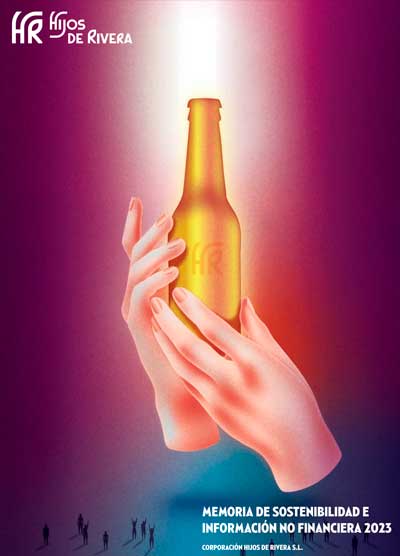For 18 months the Hijos de Rivera– UDC Chair in Sustainable Development and the Sustainable Galicia Foundation have carried out experimental work in the regeneration of the soils of over 100 micro plots on a farm located in A Laracha.
As a result, the levels of nutrients, organic matter and carbon present in the soil have been significantly increased. Most of the species, from pulses to fruits and vegetables, proved to be suitable to be cultivated in intensive eucalyptus plantations, with a lower demand for care, but also with lower production than traditional crop management.
The Hijos de Rivera – UDC Chair, together with the Galicia Sustainable Foundation, presents the results of 18 months of experimental work in regenerative agriculture models that value the resources of the environment and allow the restoration of ecosystems affected by human activity. The result was the creation of more than 100 micro plots in the Concello de A Laracha, from which the results that are now presented have been extracted.
The director of the Hijos de Rivera-UDC Chair in Sustainable Development, Ángel Fernández Castro, has highlighted the commitment of research in the field of regenerative agriculture. “The objective results are promising and of social utility for Galician agriculture” he said expressing his intention to continue promoting the study, both in relation to the evolution of the ongoing trials, and extending it to other possible crops.
Jose Manuel López, Mayor of A Laracha, pointed out that “the Sustainable Galicia Foundation is developing a project which brings hope for the prosperity of rural areas. From an environmental perspective, the results presented today show that small transformations in management models can have an impact for more sustainable agriculture. These good results reinforce our enthusiasm for the other projects underway, especially those related to the digitalization of the primary sector.”
Marcos Pérez of the Sustainable Galicia Foundation tells us about the initial difficulties of certain approaches: “all the people we spoke to took for granted that good results would not be achieved, and even we thought so after a while. But that’s what experimentation is all about, trying things that are not obvious and, in the end, the positive results achieved in this short period of time drive us to continue working on this and other lines that can make rural areas more prosperous and sustainable”.
The project focuses on soil regeneration in eucalyptus plantations. To do this, different types of biomass and a sequence of complementary crops are used that favour the recovery of the capacity of soils that are currently already in use in intensive eucalyptus monoculture.
Regenerate soils with proximity by-products
The analysis of the recovery of productive capacity of the soil is carried out by direct and indirect methods. The first are the result of the comparison of data analysis from the laboratory and the second through the observation of the productive capacity of plantings and transplants.
The results show that an increase in NPK macronutrients (sodium, phosphorus and potassium) has been achieved, although it has not been possible to alter, with these methods, the acidity of the soils characteristic of eucalyptus plantations.
Increased biodiversity
On the other hand, the evolution and the analyses carried out on the sowing and transplanting show that the phytotoxic effects of the intensive planting of eucalyptus trees are very slight in terms of germination capacity. Germination has been successful, to a greater or lesser extent, in all species, and turnips and peas, beans, chard, carrots, potatoes and strawberries have shown their viability in eucalyptus plantations. Germination has occurred but with great growth difficulties in corn, leeks and beets. The exceptions in this experimentation have been aubergine, melon, watermelon and peppers.
Although in many cases the management of the plantations has been easier in terms of care or maintenance in the plantations under eucalyptus, the final productions maintain overwhelming differences in favour of the traditional management of the crops. However, we continue to work with the species with the greatest potential, especially red fruits (different varieties of raspberries, blueberries, blackberries, blueberries, currants, goji and strawberries) and potatoes.
Agriculture in the face of climate change
Another of the results observed was the increase in both total carbon and organic matter, positive aspects of this management through vegetable mulching for crops, confirming the possible contribution of soils as carbon sinks through the contribution of organic matter as proposed by the “4 per 1000” initiative presented at COP21 in Paris.
Economy, environment and social advancement
The research project has been promoted by the Hijos de Rivera-UDC Chair in Sustainable Development, whose main objective is to exploit innovative and disruptive models that guarantee the balance between economic competitiveness, respect for the environment and social advancement. In this project, they are evaluated with regenerative agriculture methods to address the global challenge of developing a more resilient environment that can face climate change and supply food to a growing population.
On the Chair website, the main results obtained can be found: https://www.fundacion.udc.es/catedra-hijosderivera-udc/ .






